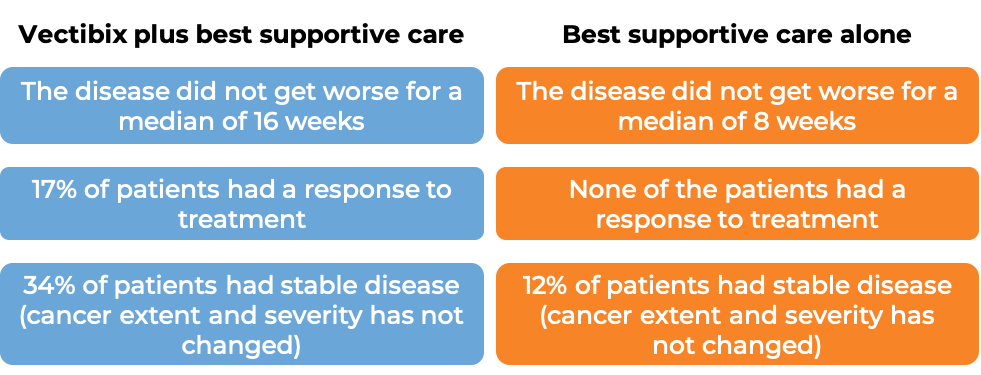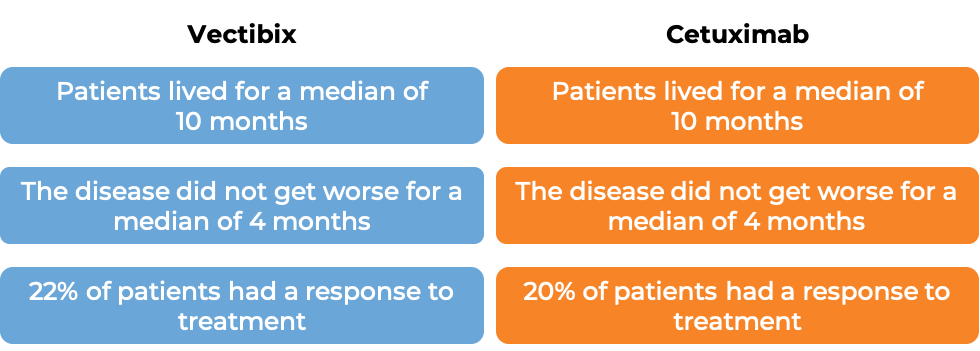How is this drug name pronounced?
Panitumumab: PAN-ih-TOO-myoo-mab
Vectibix: VEK-tih-bix
What cancer(s) does this drug treat?
Advanced colorectal cancer
Vectibix is approved for:
- Patients with colorectal cancer that has spread to other parts of the body, whose cancer has normal (“wild-type”) copies of the RAS genes (including KRAS), and who have not received treatment for their advanced disease. In such cases, Vectibix is used in combination with chemotherapy (leucovorin, fluorouracil, and oxaliplatin) as a first treatment.
- Patients with colorectal cancer that has spread to other parts of the body, whose cancer has normal (“wild-type”) copies of the RAS genes (including KRAS), and who have received prior treatment containing fluoropyrimidine, oxaliplatin, and irinotecan, and their disease got worse after that treatment. In such cases, Vectibis is used without chemotherapy.
Limitations of use:
Age: The safety and efficacy of Vectibix in patients under 18 years of age have not been established.
Fertility/Pregnancy/Breastfeeding: Vectibix may temporarily impair fertility in women. In pregnant women, Vectibix may cause harm to the fetus and is not recommended for use during pregnancy. Women are advised to use contraception during treatment with Vectibix and for at least 2 months after the last dose of Vectibix. The risks associated with Vectibix during breastfeeding are not known and cannot be ruled out. Due to the potential for serious adverse reactions in the breastfed child, women are advised not to breastfeed during treatment with Vectibix and for at least 2 months after the last dose of Vectibix.
Interaction with other drugs: Vectibix should not be administered in combination with bevacizumab (Avastin, Mvasi, Zirabev).
Exclusions: Vectibix should not be administered to patients with cancers that have mutations in the RAS genes, or when the mutation status of the RAS genes is unknown.
What type of immunotherapy is this?
- Cell growth inhibitor
How does this drug work?
- Target: epidermal growth factor receptor (EGFR)
Vectibix is an antibody that was designed and made in the laboratory to attach to and block a protein molecule called epidermal growth factor receptor (EGFR). EGFR is present on the surface of many normal cells (such as cells in the skin and hair follicles), and is also present in much higher quantities on the surface of many types of cancer cells, including cancers of the colon and rectum. When certain molecules (such as epidermal growth factor [EGF]) bind to EGFR, the cells receive signals to ensure the cells’ survival and encourage the cells to grow and multiply. Higher than normal amounts of EGFR allow cancer cells to grow and multiply out of control.
Vectibix binds to EGFR on the surface of normal and cancer cells in a way that blocks the interaction between EGFR and growth signal molecules. This prevents the cells from persisting and multiplying, and causes cells to die. The higher amounts of EGFR on the cancer cells make these cells the main target of Vectibix.
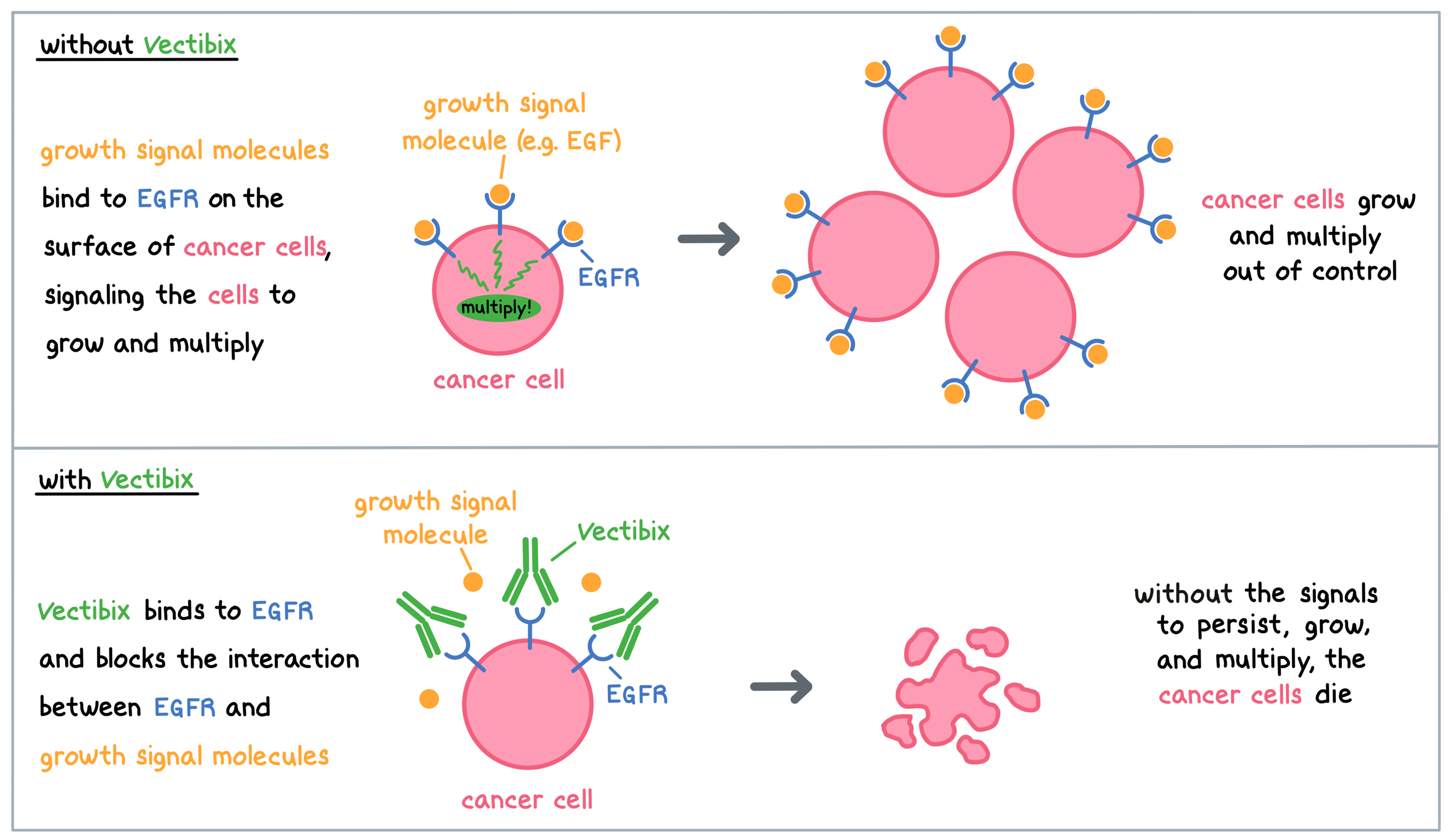
Colorectal cancer cells that contain mutated RAS genes do not depend on EGFR for their survival and growth, and can multiply out of control even when EGFR is blocked.
How is this drug given to the patient?
Vectibix is administered via a tube into a vein (intravenous infusion, or I.V.) over 60 to 90 minutes every 14 days. If the first infusion is well tolerated, subsequent infusions may be administered over 30 to 60 minutes.
What are the observed clinical results?
For:
Advanced colorectal cancer (treated with Vectibix alone)
Advanced colorectal cancer (treated with Vectibix plus chemotherapy)
It is important to keep in mind that each patient’s actual outcome is individual and may be different from the results found in the clinical studies. In addition, with immunotherapy, sometimes it takes several months for responses to be observed.
Advanced colorectal cancer (treated with Vectibix alone)
In a clinical trial, 463 patients with colorectal cancer that had spread to other parts of the body, whose cancer tested positive for the EGFR protein, and who had received prior treatment containing fluoropyrimidine, oxaliplatin, and irinotecan, and their disease got worse after that treatment, were treated with either Vectibix plus best supportive care, or best supportive care alone.

(For the definition of “median”, click HERE. 234 patients had cancer with normal (“wild-type”) copies of the KRAS gene.)
In another clinical trial, 1010 patients with colorectal cancer that had spread to other parts of the body, whose cancer had normal (“wild-type”) copies of the KRAS gene, and who had received prior treatment containing oxaliplatin, irinotecan, and a thymidylate synthase inhibitor, were treated with either Vectibix or cetuximab (Erbitux). This trial was set out to study if Vectibix and cetuximab, which both target the EGFR protein on cancer cells, would deliver a similar benefit for patients. At a median follow-up of 41 months:
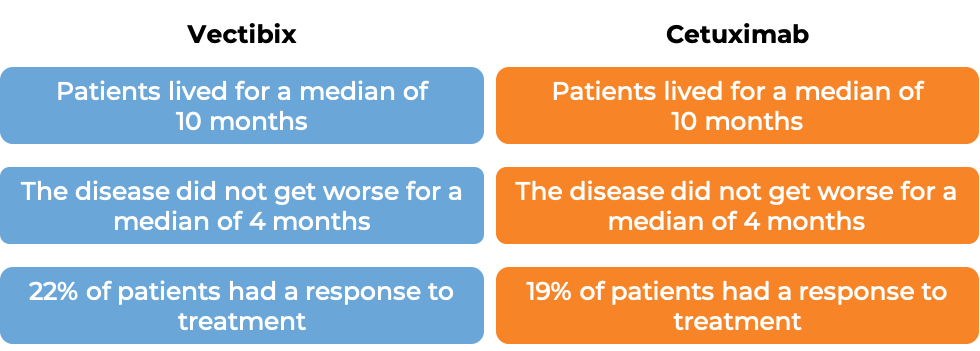
In another clinical trial, 377 patients with colorectal cancer that had spread to other parts of the body, whose cancer had normal (“wild-type”) copies of the KRAS gene, and who had received prior treatment containing oxaliplatin, irinotecan, and a thymidylate synthase inhibitor, were treated with either Vectibix plus best supportive care, or best supportive care alone. At a median follow-up of 41 weeks for Vectibix plus best supportive care and and 26 weeks for best supportive care alone:
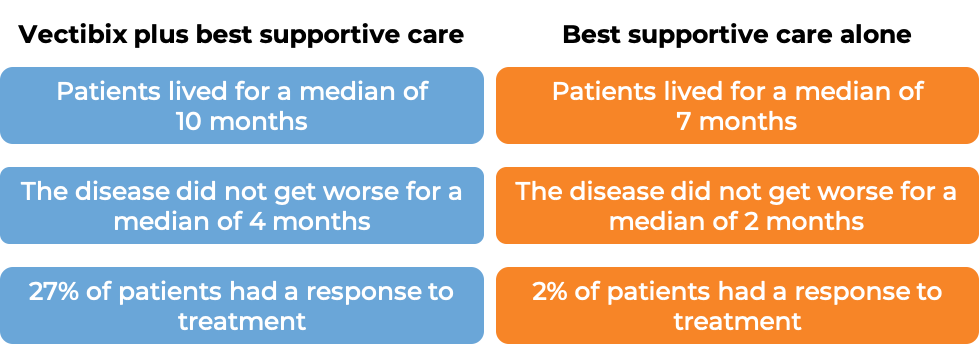
Advanced colorectal cancer (treated with Vectibix plus chemotherapy)
In a clinical trial, 1183 patients with colorectal cancer that had spread to other parts of the body, who had not received treatment for their advanced disease, and who had not previously received oxaliplatin (Eloxatin), were treated with either Vectibix plus chemotherapy (leucovorin, fluorouracil, and oxaliplatin), or chemotherapy alone. Among the 512 patients whose cancer had normal (“wild-type”) copies of the RAS genes (including KRAS), at a median follow-up of 80 weeks:
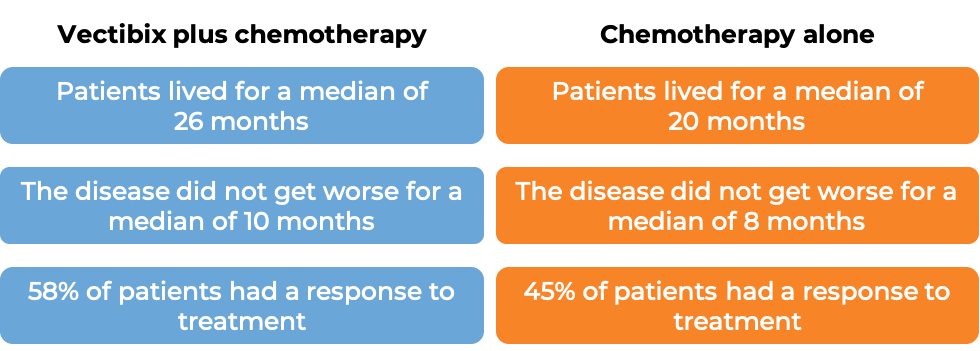
What are the side effects?
The most common side effects of Vectibix include fatigue, diarrhea, nausea, vomiting, constipation, stomach ache, tiredness, lack of appetite, reactions related to the infusion, low levels of electrolytes (including magnesium, calcium, and potassium), sore mouth, infection at the sides of finger or toe nails, rash, skin inflammation that looks like acne, itching, red skin, and dry skin. Almost all patients treated with Vectibix experienced some kind of skin reaction. Exposure to sunlight could worsen skin reactions, and patients are advised to limit sun exposure and wear sunscreen and hats.
Vectibix can cause side effects that can become serious or life-threatening, and may lead to death. Some of the serious side effects related to Vectibix include severe skin reactions (which could lead to severe infections and death), severely low levels of electrolytes, severe diarrhea and dehydration, problems with kidneys (including kidney failure), lungs (including fatal lung disease), and eyes (including an inflammation of the the clear layer of tissue covering the pupil and iris), and reactions related to the infusion.
Patients should report any symptoms to their healthcare provider, who can then initiate actions to limit or reverse the side effects. For a more complete list of possible side effects, see the full prescribing information.
Additional information
Manufacturer
Amgen
Approval
FDA and EMA
Links to drug websites
Other references
- A phase 3 trial evaluating panitumumab plus best supportive care vs best supportive care in chemorefractory wild-type KRAS or RAS metastatic colorectal cancer. Kim TW et al. British Journal of Cancer (2016)
- Panitumumab versus cetuximab in patients with chemotherapy-refractory wild-type KRAS exon 2 metastatic colorectal cancer (ASPECCT): a randomised, multicentre, open-label, non-inferiority phase 3 study. Price TJ, Peeters M et al. The Lancet Oncology (2014)
- Final results from PRIME: randomized phase III study of panitumumab with FOLFOX4 for first-line treatment of metastatic colorectal cancer. Douillard JY et al. Annals of Oncology (2014)
Last updated: March 9, 2022
